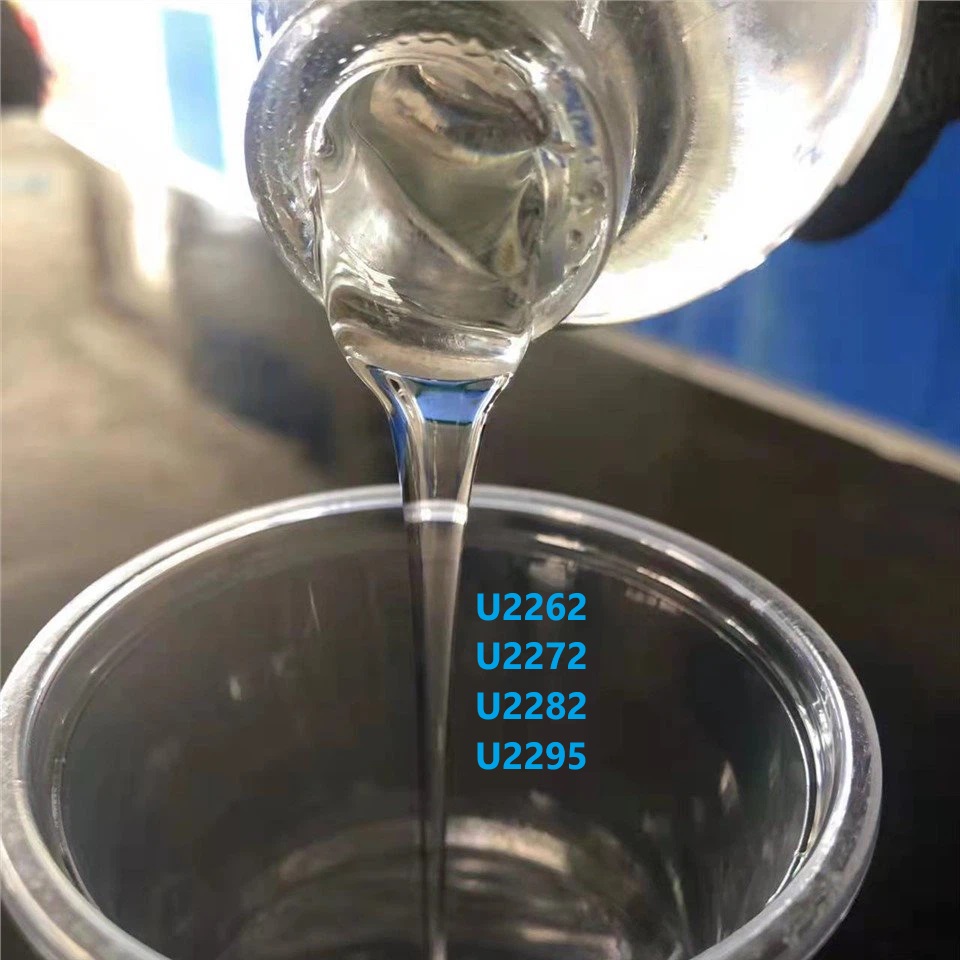MDI Polycaprolactone Prepolymers

Index | U2262 | U2272 | U2282 | U2295 |
NCO Content (%) | 6.2±0.2 | 7.2±0.2 | 8.2±0.2 | 9.5±0.2 |
Operating Conditions | ||||
Ratio (Poly: BDO) | 100:6.51 | 100:7.56 | 100:8.61 | 100:9.97 |
Prepolymer Temp (°C) | 85 | 80 | 80 | 75 |
Curing Agent Temp (°C) | 40 | 40 | 40 | 40 |
Mold Temp (°C) | 110-120 | 110-120 | 110-120 | 110-120 |
Pot Life (min) | 5-6 | 4-5 | 3-4 | 2-3 |
Demold Time (min) | 30-40 | 30 | 30 | 30 |
After Cure (h/100°C) | 16 | 16 | 16 | 16 |
Physical Performance | ||||
Shore Hardness (A) | 80±2 | 85±2 | 90±2 | 95±2 |
100% Modulus (MPa) | 5 | 6 | 7 | 11 |
300% Modulus (MPa) | 13 | 14 | 15 | 20 |
Ultimate Elongation (%) | 620 | 580 | 550 | 482 |
Tensile Strength (MPa) | 42 | 44 | 46 | 49 |
Tear Strength (without Nick) (KN/m) | 98 | 109 | 112 | 118 |
Resilience (%) | 56 | 54 | 52 | 45 |
DIN Abrasion (mm³) | 35 | 36 | 38 | 38 |
Density (25℃) (g/cm³) | 1.17 | 1.18 | 1.18 | 1.19 |
MDI Polycaprolactone (PCL) Prepolymers offer a range of advantages, especially in applications that demand high-performance, durable, and flexible materials. Here are some key benefits:
1. Excellent Mechanical Properties
· High Strength and Toughness: MDI-based polycaprolactone prepolymers provide excellent mechanical strength and toughness, making them ideal for applications requiring high durability.
· Good Elasticity: They offer a high degree of flexibility and elasticity, even in low temperatures, making them suitable for products that undergo repeated deformation or stress.
2. Superior Hydrolytic Stability
· Water Resistance: Polycaprolactone has excellent resistance to hydrolysis, meaning these prepolymers maintain their properties in moist or wet environments, outperforming other polyesters in similar conditions.
3. Biodegradability
· Environmental Impact: Polycaprolactone is known for being biodegradable, which offers an advantage in applications where environmental impact is a consideration, especially for products that have potential exposure to biological environments.
4. Outstanding Chemical Resistance
· Solvent and Oil Resistance: These prepolymers show excellent resistance to oils, greases, and many organic solvents, making them suitable for demanding chemical environments, such as in automotive, marine, or industrial applications.
5. Controlled Crystallinity
· Good Processability: Polycaprolactone offers the benefit of controlled crystallinity, leading to improved processability during manufacturing. It also enhances the mechanical properties of the final product, including its abrasion resistance and dimensional stability.
6. Thermal Stability
· Heat Resistance: Compared to other polyesters, polycaprolactone-based prepolymers tend to have better thermal stability, allowing them to perform well in moderate heat applications.
7. Customizable Formulations
· Tailored Properties: With two-component systems, the prepolymers can be customized by adjusting the ratio of components or by modifying the polycaprolactone chain length. This enables precise tuning of the final material properties, such as hardness, elasticity, and curing speed, to meet specific application needs.
8. Ease of Use in Polyurethane Systems
· Versatility: MDI polycaprolactone prepolymers are compatible with various polyols and crosslinking agents, allowing for versatility in creating polyurethane systems tailored to specific performance requirements in elastomers, coatings, adhesives, and sealants.
9. Improved Abrasion Resistance
· Durability: Products made from MDI polycaprolactone prepolymers offer excellent wear resistance, which is crucial for high-friction applications such as conveyor belts, gaskets, and seals.
10. Low Temperature Performance
· Retains Flexibility: These prepolymers maintain their flexibility and toughness even at low temperatures, which is ideal for outdoor or cold climate applications where materials are exposed to varying temperatures.
Applications:
· Elastomers: High-performance polyurethane elastomers that require strength, flexibility, and durability.
· Adhesives and Sealants: Products used in environments with exposure to oils, chemicals, and moisture.
· Coatings: Particularly in applications where abrasion resistance and environmental stability are essential.
· Medical Devices: Thanks to polycaprolactone's biodegradability, these prepolymers are also used in some bio-compatible applications.
These advantages make MDI Polycaprolactone Prepolymers an excellent choice for demanding industrial and commercial applications that require materials with high durability, chemical resistance, and flexibility.
